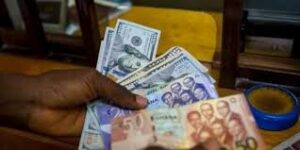
Adnan Adams Mohammed
To sustain the recent appreciation of the Ghanaian Cedi, economists have asked managers of the economy to adopt and implement a robust exchange rate management framework.
They believe that without firm regulatory oversight and improved market discipline, the local currency’s ongoing appreciation risks being short-lived.
The recent appreciation of the Cedi has earned it the status of the world’s best-performing currency in recent weeks, bolstering confidence in Ghana’s monetary authorities. However, the Institute for Statistical, Social, and Economic Research (ISSER) has stressed the need for consistent macroeconomic policies to anchor confidence in the local currency.
“So to ensure stability in our exchange rate, we have to continue to have the kind of monetary policies we are having now; and the Bank of Ghana continues to shore up our gold reserves”, Professor Peter Quartey, Director of ISSER said in an interview last week.
“Then also we must enforce the exchange rules; it is only in Ghana where one can walk to a corner and buy dollars and pounds and walk around with it. In other jurisdictions they take your passport so they know what it is going to be used for.
“Take advantage of the geopolitics because the US Dollar is losing some value, but it may reverse given that now the US has a temporary trade deal with China”, he added.
Consequently, a Bank of Ghana board member, Isaac Adongo, has disclosed plans to clamp down on over-the-counter US dollar withdrawals in a move aimed at sustaining the local currency’s momentum.
The policy, which builds on existing restrictions, would be expected to introduce even tighter controls, essentially halting routine dollar cash withdrawals from bank counters except in rare, approved cases.
“If you put your dollars in the bank account, it is okay. We are happy with that; you can only get dollars if indeed you are going to use them for a dollar-denominated transaction,” Adongo indicated in an interview last week.
The Bolgatanga Central MP emphasised the central bank’s authority in determining how foreign exchange is used within the economy.
“The central bank’s role includes regulating the use of our legal tender. When you request dollars, we’ll provide cedis instead.”
At the heart of the move is a strategy to neutralise speculative dollar demand and reduce the pressure on the local currency by limiting access to physical dollars.
“You’ll see the results reflected in the dollar rate,” Adongo stated. “We’re eliminating dollar speculation through bank accounts. Deposited dollars will only be released for legitimate foreign transactions – dollars are meant for spending abroad, not domestically.”
However, the Ghana Bankers Association has refuted claims suggesting an imminent restriction on over-the-counter (OTC) withdrawals of foreign currencies, particularly U.S. dollars, from banks and financial institutions in Ghana.
The President of the Bankers Association, John Awuah, stated categorically that no such directive has been issued by the Bank of Ghana yet.
“We have not received any directive from the Bank of Ghana that bars the withdrawal of foreign currency over the counter. As we have been operating in the past, as it is today, it will be the same tomorrow until such a directive is formally communicated to us, the mode of operations for foreign accounts in Ghana.”
Mr. Awuah reaffirmed that banks remain guided by the existing legal and regulatory framework, and that no official changes have been made to affect the public’s ability to access foreign currency.
“We operate under Act 721 of 2006, which may undergo some review, but that is the guiding act, as has been updated with notices and directives from the Bank of Ghana. None of those directives stipulates the barring or discontinuation of over-the-counter foreign exchange withdrawal – there is a process.”
He acknowledged that due diligence procedures are in place, but stressed that account holders with legitimate needs can still access foreign currency as usual.
Subsequently, the Bank of Ghana last week issued a statement to the general public re-emphasising on the existing regulatory compliance on US dollar withdrawals from banks.
Additionally, the Centre for Economic Research and Policy Analysis (CERPA) has called for sustained economic discipline and targeted policy interventions to maintain the recent appreciation of the Ghanaian cedi, which has become the world’s best-performing currency in 2025.
In a new policy brief released last week, CERPA analysed the drivers behind the cedi’s nearly 16% gain against the US dollar and outlined the economic benefits and risks associated with the currency’s rebound.
To sustain the cedi’s gains and avoid potential setbacks, CERPA has recommended: Maintaining fiscal discipline to ensure macroeconomic stability; Encouraging the reinvestment of foreign profits to support the forex market; Promoting import substitution through support for local industries and agriculture; Strengthening the gold purchase programme to secure reserve backing; and Implementing targeted monetary policies to keep inflation in check.
CERPA noted that while the cedi’s appreciation is a positive sign, it remains fragile without consistent economic management.
“A coordinated strategy that strengthens exports, supports domestic production, and maintains investor confidence is crucial to turning recent gains into long-term resilience” its policy brief asserted.


